Fencing of landed properties is very common in Nigeria. For residential and commercial buildings in rural, semi-urban, and urban areas in Nigeria, it is very common to construct fences using sandcrete block walls around the perimeter of the property. Fencing is done for a lot of reasons such as security, restriction of unguided access, privacy, and protection of the property from encroachment and land grabbers.
Other materials can be used in the construction of fences such as concrete walls, sandcrete block walls, timber/wooden panels, gabion walls, steel plates, wire mesh, bricks etc. However, sandcrete blocks are the most common in Nigeria. This is mainly due to the availability of materials and labour, convenience, flexibility, different options for finishes, stability, low maintenance, and durability of sandcrete block fences.
Fence Construction in Nigeria
The materials that are commonly used for the construction of masonry wall fences are;
- Sandcrete blocks
- Cement
- Sand
- Gravel, and
- Water
Other ancillary components that are usually found in fences are copings, railings, barbed fence wire, electric fence wires, etc. For beauty, other finishes such as cornices and mouldings of different types may be added. It is also important to note that fences are ultimately provided with access gates which can be constructed of wrought iron, timber, aluminium, or stainless steel.
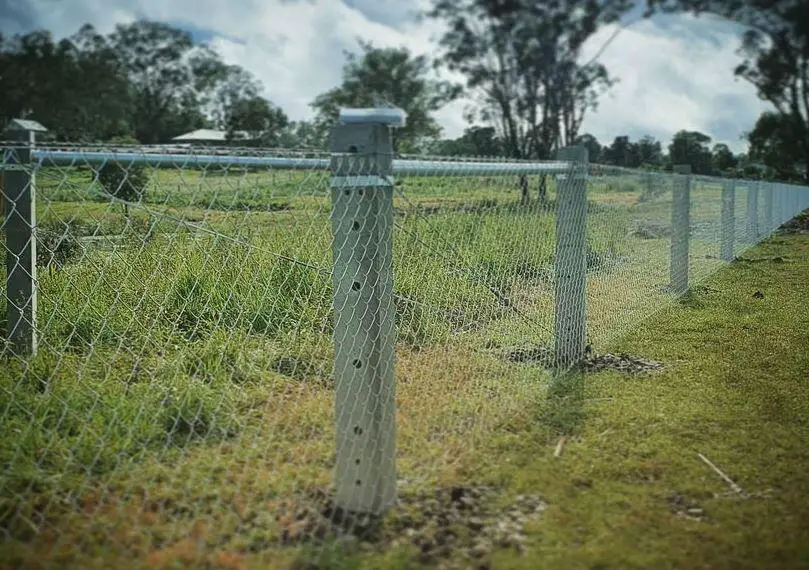
For durability and aesthetics, it is very important that fences constructed with sandcrete masonry walls be plastered on both faces and the top of the wall protected with concrete coping. The coping may be precast or cast in-situ.
For fences that are to be constructed on sites with marginal soils or marshy soils with low bearing capacity, it is very important that reinforced concrete columns (pillars) be provided at intervals of about 3 metres. Normally also, it is not advisable to have a very long stretch of fence walls without introducing separation (open joints) or properly bound block pillars. This adds more stability and beauty to the wall, and prevents progressive failure whenever there is a lateral impact on the wall.
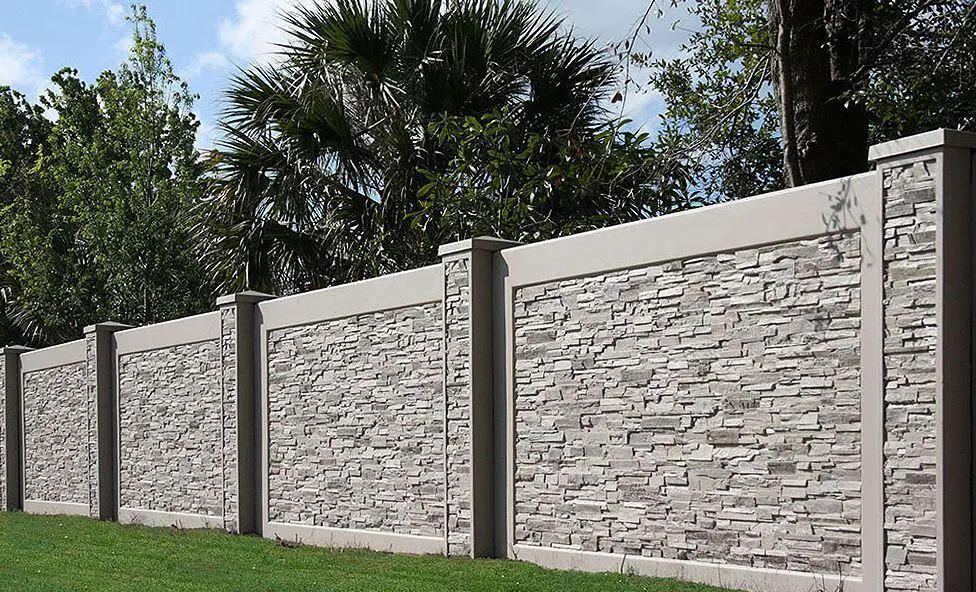
It is also important that the fence be chained (in a manner similar to reinforced concrete lintels) at the foundation level and/or at the mid-level. By so doing, the movements, swelling pressure, and shrinkage-induced stresses from the surrounding soil will not cause cracks or failure of the fence.
The height of the fence wall around a property can be determined by a lot of reasons such as building regulations, cost, client taste/intentions, aesthetic requirements, and security requirements. Typically, the average height of fences constructed using sandcrete blocks is around 2.25 metres (approximately 10 blocks) above the ground level. The height may however vary depending on some of the factors listed above which are explained below;
Building Regulations:
In many locations or estates in Nigeria, there are laws or guidelines on how fences should be constructed. Some of these guidelines may include set-back from the road, height, design, colour, etc. The maximum height of a fence may occasionally be specified by a local government ordinance, building control or town planning agencies, etc., in which case all residents building fences in that region must abide.
Clients’ taste/intentions:
Where regulations on fencing do not abide, the height and type of fence may also be influenced by individual preferences. Some people like shorter fences so they can display their homes better, while others may prefer a completely concealed compound. Sometimes also, the height of a fence may be influenced by cost, especially when the client is indifferent to security and/or privacy.
Aesthetic requirements:
As was previously mentioned, the height of a fence may be influenced by the desire to display the home’s attractiveness. In this situation, people almost always choose short or average fences.
Security requirements:
Many homeowners use higher fences to protect their homes from intruders, enhance privacy, and take people’s attention off their property. This is very typical in areas with volatile security issues.
The Process of Fencing in Nigeria
When fences are to be constructed on sites with good soil, strip foundations are typically adopted. For sloping terrain, the foundation can be stepped at intervals to prevent failure of the foundation due to scour or loss of bearing capacity due to erosion. The depth of foundation for fences is typically around 2 feet (600 mm), while the thickness of the concrete strip can be between 100 mm to 150 mm of grade 15 concrete, or according to the structural engineer (for challenging soils).
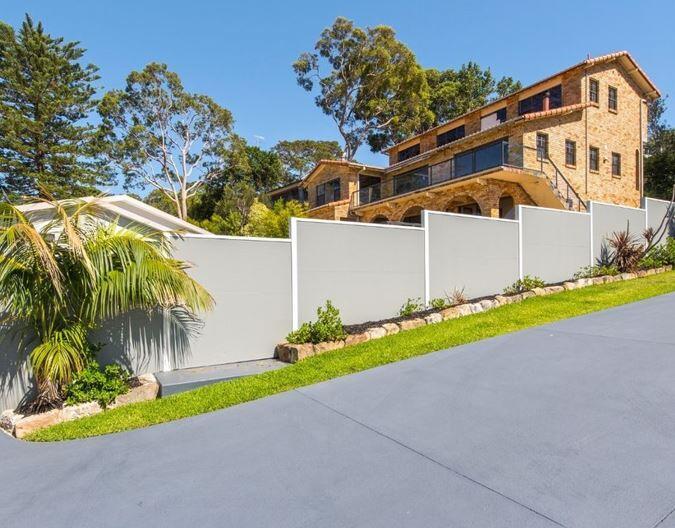
Fences can be constructed using different types of sandcrete blocks such as 9 inches hollow blocks, six inches blocks (hollow or solid), five inches blocks (hollow or solid), etc. The process of constructing fences in Nigeria is therefore as follows;
(1) Excavation of the strip footing to the required level
(2) Levelling and compaction of the footing base to receive concrete
(3) Establishment of the block pillar or reinforced column locations and installation of appropriate bases and rebars
(4) Pouring of the concrete strip footing
(5) Laying of blocks and forming of the block pillars (where applicable)
(6) Casting of the columns (where applicable)
(7) Installation or casting of the copings
(8) Installation of the gates and railings
(9) Plastering and finishes
(10) Installation of barbed wire or electric security wires
Cost of Fencing One Plot of Land in Nigeria
In many states in Nigeria, the size of one plot of land is 450 m2 (5000 ft2), typically comprising a parcel of land measuring 30 m x 15 m (100 feet x 50 feet). This dimension will be used in estimating the cost of fencing a plot of land in Nigeria. Furthermore, the size of the opening for gates is usually about (4 to 5 metres). For this calculation, 5 metres will be adopted.
It will be assumed that reinforced concrete columns will be provided at intervals of 3m across the fence line.
Therefore, the perimeter to be fenced = 2(30) + 2(15) – 5 = 85 m
Height of fence = 2.25m (above natural ground level) + 0.5m (below ground level) = 2.75m
Cost of foundation excavation
Total number of partitions to be excavated = 24
Cost of excavation per partition = ₦1200
The total cost of excavation = ₦28,800
Cost of Concrete works (foundation and pillars)
The volume of concrete required for the foundation = 6m3
The volume of concrete required for columns = 2.8 m3
Cement required = 40 bags @ ₦4,200 = ₦168,000
Granite required = 15 tonnes = ₦135,000 (depending on location, transportation alone may double this price)
Sand required = 10 tonnes = ₦40,000
Labour = ₦72,000
Total cost of concrete works = ₦415,000
Cost of Column formworks
1″x12″ planks = 28 pcs (reuse twice) @ ₦1,500 = ₦42,000
3″ inches nails (allow) = ₦4,000
Labour (allow) = ₦20,000
Total = ₦66,000
Cost of Column Rebars
Y10mm bars = 28 pcs @ ₦3,300 = ₦92,400
R6 mm stirrups = 35 pcs @ ₦1,200 = ₦42,000
Binding wire allow = 1 roll = ₦17,000
Labour allow = ₦25,000
Total = ₦176,400
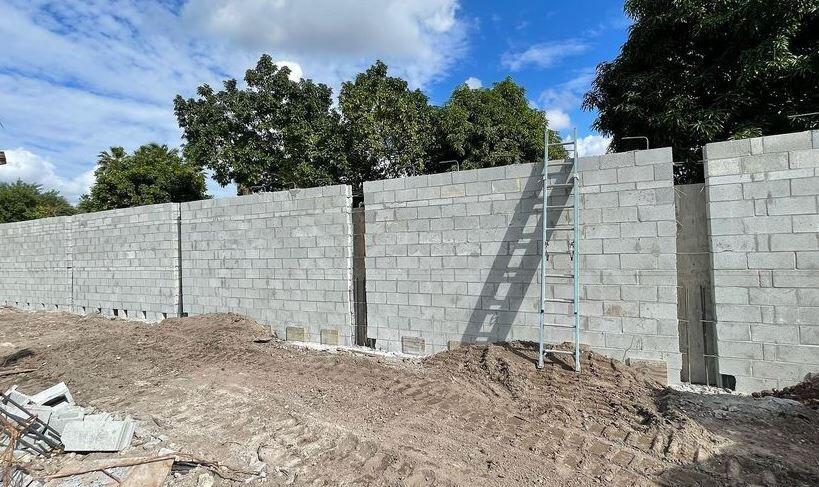
Cost of block wall
The total area of the block wall = 233.75 m2
Number of blocks required = 2340 (no allowance for wastes has been made)
Unit Price of 6 inches blocks = ₦220
Total cost of blocks = ₦514,800
Cement required = 45 bags
The unit price of cement = ₦4200
The total cost of cement = ₦189,000
Sand required = 16 tonnes
Supply 20 tonnes of sharp sand = ₦70,000
The cost of labour = ₦187,200
Total cost for the fence walls = ₦514,800 + ₦189,000 +₦70,000 + ₦187,200 = ₦961,000
(Depending on the location, allowance for the cost of water should also be made)
Furthermore, allowance for contingencies such as scaffolding should also be made.
The total cost of fencing one plot of land in Nigeria = ₦28,800 + ₦415,000 + ₦66,000 + ₦176,400 + ₦961,000 = ₦1,647,200
Therefore, the cost of fencing one plot of land in Nigeria is about ₦1,647,200, disregarding the contractor’s profit and overhead.

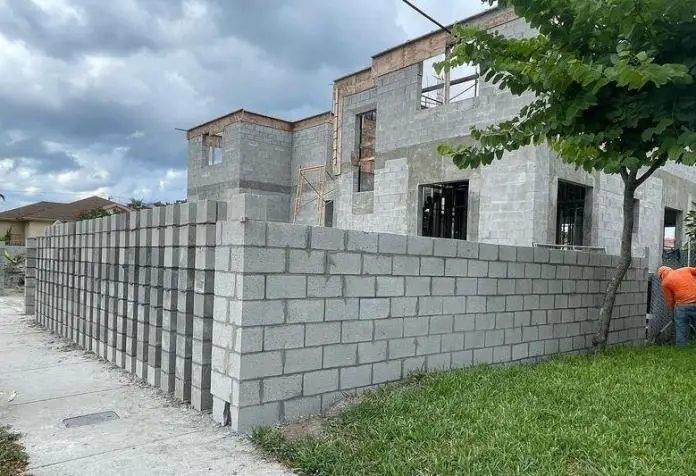




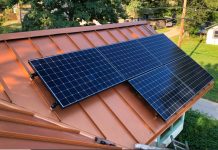


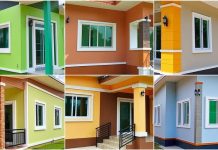
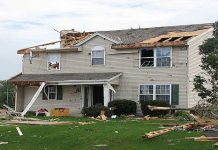
Perfect analysis thanks boss
Helpful.
Thanks.
Fencing a plot of land in Nigeria has become more than just a security measure. With rising material costs and labor expenses, the cost has surged. It’s crucial to balance safety with budget considerations.